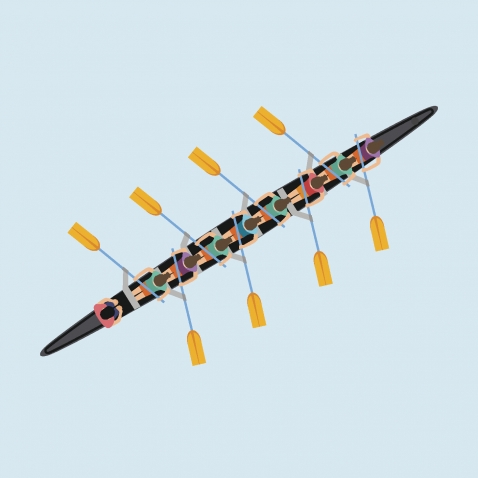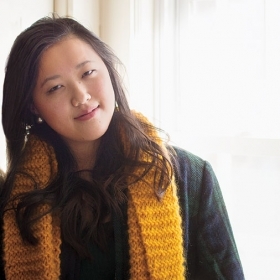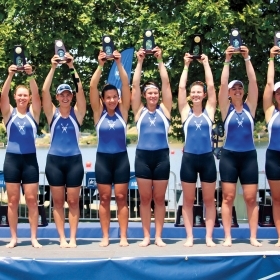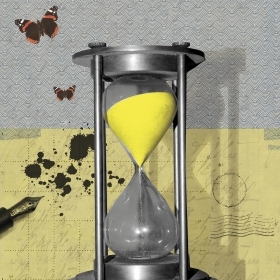On the day I graduated, I said good-bye to sliding seats, wooden oars, and Wellesley’s only crew shell fit for intercollegiate rowing. With 1973 classmates—a cox and three other rowers—I’d pulled a portside oar in Wellesley’s first boat to row against other colleges. We didn’t win a race. That wasn’t the point; being a crew team representing our College was.
Wellesley later named our shell Spirit of ’73. She’s in storage now, long ago put out of service by sleeker, lighter fiberglass shells. At our 40th reunion, we asked to row her again. Each of us in her original seat, we flew across the lake with joyful abandon, not wanting our row to end. I felt grateful knowing what we were privileged to begin.
It started in the fall of our junior year when we showed up for class crew. My memory is crystal clear of meeting this donated shell. With her seats facing down, she rested on sawhorses to the side of our floating fleet. My hand rubbed along the glistening hull, following her slender, sculpted shape. Towering oars leaned against a nearby wall.
Barbara Jordan, the PE instructor who ran the boathouse, motioned a few of us aside. We’d row this racing shell today, she told us. Carrying the shell to the water presented a steep learning curve. “Lift to waist,” Jordan said, issuing her commands slowly. “Shoulders, ready, up.” We hoisted; it was my first time shouldering a shell’s weight. We walked to the dock’s edge, rolled the shell to our waists, and gently lowered her to the water.
Seats assigned, we secured our oars. One foot planted in the boat, we swung the other toward odd-looking booties for our feet. Jordan took the cox’s seat. Away from the dock, our shell swayed with unaccustomed tipsiness. We feathered our blades, holding them flat on the water to balance our shell. All felt new; in the tubbier shells used for dorm and class crew, we suspended our oars’ blades like opened fans in a breeze.
We stayed a team; our classmate Ridgely Ochs (“Ochs the Cox”) took Jordan’s seat. Morning, noon, and afternoon we rowed on Lake Waban. That fall, we competed against other schools, wearing unmatched T-shirts and whatever pants we had. Rowing as Wellesley was one thing, but uniforms were a distant thought. In the spring, enough rowers turned out to fill an intercollegiate eight. Wellesley didn’t own a racing eight, so we woke early, drove to the MIT boathouse, rowed on the Charles River, and ate breakfast in our dorms. In our senior year, Wellesley raced its first eight in the Head of the Charles, finishing seventh out of 12.
Forty-four years later, I’m back rowing on the Charles River three mornings each week. At 5:35 a.m., we’re on the dock. On our first March outing, as we readied our shell, I heard clicking oars on the river. From around the river’s bend, grey-hulled shells powered by blue and white oars emerged. I saw WELLESLEY on their hulls, barely readable in the winter dawn’s dim light.
“Go, Blue! Go, Wellesley,” I shouted, startling my boatmates. From that morning on, shouting to them was ritual. For me, it was an invisible tether connecting our baby strokes in the Spirit of ’73 to these powerful, polished rowers and their enviable pace.
On the morning of my 65th birthday, when I became a “senior citizen,” I rowed—without a dockside shout-out. Wellesley’s rowers were in California to compete. Midway through our row, we paused, and the coach asked if I had a birthday wish. “Let’s shout, ‘Go, Blue,’” I said. “Wellesley’s at the NCAAs.” He smiled. We shouted. By the next day, Wellesley was the NCAA Division III champ, earning the College’s first NCAA win by any team.
Later in the summer, my daughter, a Wellesley sophomore, told me there was a member of the crew team also working at her summer job. “I asked her if she heard someone shouting ‘Go, Blue’ on the Charles,” said Maya, who knew about my morning hollers. “Oh, yes,” her friend replied. “We don’t know who she is, but we love that woman!”
It’s fall now, and Wellesley is on the Charles, rowing from the boathouse upstream from mine. I’m shouting still. Perhaps a few of these rowers know now that I once rowed as they do now, albeit not nearly so well. Decades from now, when their NCAA win is lore of aging alumnae, I hope they get to shout, “Go, Blue,” to young rowers. They’ll know just how I feel.
Melissa Ludtke ’73 is a longtime journalist whose grandmother Teresa Pastene Edwards stroked for the 1907 Wellesley crew team.







